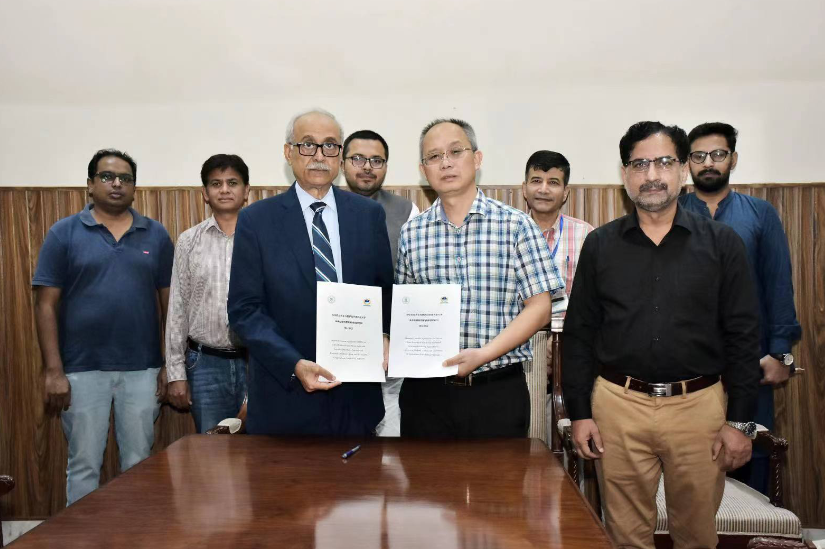Pakistan, China ink Material Transfer Agreement to boost citrus industry
By Mariam Raheem
FAISALABAD, Oct. 4 (Gwadar Pro)- The University of Agriculture, Faisalabad (UAF) and Huazhong Agricultural University, Wuhan (HZAU) inked a Material Transfer Agreement (MTA) for citrus rootstock and scion budwood in a ceremony held at UAF on September 30. Prof. Dr. Liu Yongzhong, a collaborative scientist from HZAU, handed over nine citrus varieties budwood to Prof. Dr. Iqrar Ahmad Khan, Vice Chancellor of UAF, under the Higher Education Commission-funded project (CEPC-CRG-447).
The agreement marks a major step in the ongoing collaboration between the two universities aimed at enhancing the citrus industry in Pakistan. Last year, UAF and HZAU signed a memorandum of understanding to establish a China-Pakistan Horticulture Research and Demonstration Center with the urgent objective of improving citrus production and fruit quality and ultimately increasing profitability.

Prof. Dr. Iqrar Ahmad Khan, Vice Chancellor, UAF, Prof. Dr. Liu Yongzhong, collaborative scientist, HZAU ink a MTA for citrus rootstock and scion budwood [Photo/UAF]
Citrus holds a prominent position among the thirty fruit crops grown in Pakistan, ranking first in terms of area (approximately 200,000 hectares) and production (2.29 million tonnes). In 2021, Pakistan generated $171 million through citrus fruit exports, accounting for one-third of the total value of fruit exports. Punjab stands out as the largest citrus producer in the country, contributing over 95% of the total production. The mandarin fruit ‘Kinnow’ is the most cultivated citrus variety in Pakistan, accounting for over 80% of other citrus genotypes, due to its attractive peel color, size, ease of peeling, high juice content, and excellent taste and aroma.
However, citrus trees are sensitive and prone to both biotic and abiotic stresses. Climate change poses serious challenges to citrus growth and productivity due to abiotic stresses. Additionally, recent years have seen an increase in insect pest infestations on fruit plantations. Pakistan’s citrus production per unit area is significantly lower (11.4 tonnes/hectare) compared to developed countries (25 tonnes/hectare), with reduced tree lifespan and compromised fruit quality adversely affecting export potential.
Only 10% of the total citrus production is exported, leading to severe financial constraints for citrus producers who must sell their produce locally at lower prices. Moreover, the Kinnow mandarin, a late variety, has a short harvest window of 2-3 months, further limiting production and export opportunities.
The MTA signed between UAF and HZAU aims to address these challenges by introducing new citrus varieties and technologies that can improve productivity, manage diseases, extend the harvest window, and diversify varieties to reduce the risk associated with Kinnow monoculture. This collaboration is expected to have a significant positive impact on the citrus industry in Pakistan, ultimately benefiting farmers and the economy.
This article originally appeared on Gwadar Pro.
(Editor: wangsu )


